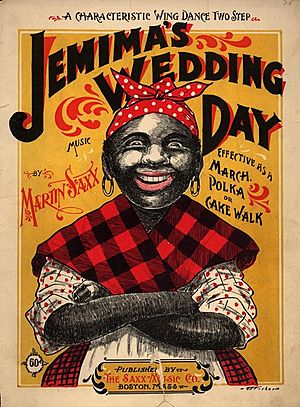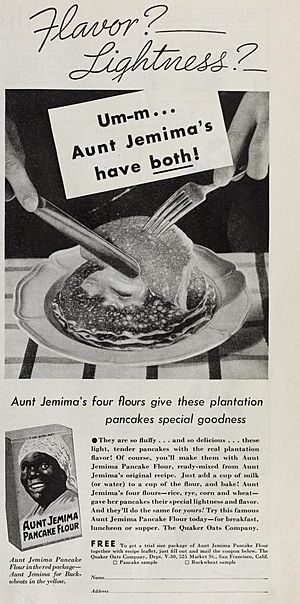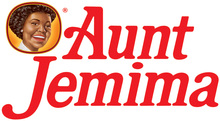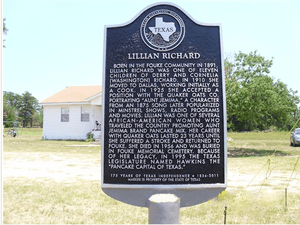Aunt Jemima facts for kids

Logo as of January 2021
|
|
| Owner | Quaker Oats |
|---|---|
| Introduced | November 1, 1889 |
| Markets | Worldwide |
Aunt Jemima was a well-known brand of pancake mix, syrup, and other breakfast foods. The pancake mix was first created in 1888–1889 by the Pearl Milling Company. It was advertised as the first "ready-mix," meaning you just added water.
The character of Aunt Jemima was based on a "Mammy" character, which was a stereotype of an enslaved Black woman. This image has been criticized for many years. In June 2020, the Quaker Oats Company, which has owned the brand since 1926, announced that the Aunt Jemima brand would be changed. They wanted to help achieve racial equality. In February 2021, they shared that the brand would be renamed Pearl Milling Company, after the original creators of the pancake mix. The new brand launched in June 2021.
Nancy Green was one of the first people to play Aunt Jemima. She appeared at the 1893 World's Columbian Exposition in Chicago. She was one of the first Black models hired by a company in the United States. Later, many actors were hired to play the role as part of a big sales campaign.
Contents
History of the Aunt Jemima Brand
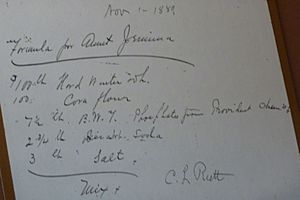
In 1888, Chris L. Rutt and Charles G. Underwood bought a flour mill in St. Joseph, Missouri. Their company, Pearl Milling Company, had a lot of flour. They decided to sell some of their extra flour as a pancake mix. They called it "Self-Rising Pancake Flour." This was one of the first ready-to-use baking mixes.
In 1889, Rutt got the idea for the "Aunt Jemima" name and image from posters he saw at a show. However, Rutt and Underwood soon ran out of money. They sold their company to the Randolph Truett Davis Milling Company in 1890. This company was already well-known for flour.
The Davis Milling Company made the pancake mix even better. They added rice flour and corn sugar. They also added powdered milk, so people only needed to add water to make the batter. In 1914, the Davis Milling Company changed its name to Aunt Jemima Mills.
In 1915, a new rule in trademark law was set because of the Aunt Jemima brand. Before this, trademarks only protected against others selling the exact same product. But with the "Aunt Jemima Doctrine," the pancake mix company was protected even from a company selling pancake syrup with a similar name. This showed how famous the brand had become.
The Quaker Oats Company bought Aunt Jemima Mills Company in 1926. They officially registered the Aunt Jemima trademark in 1937. It became one of the longest-running logos in American advertising history. Quaker Oats later introduced Aunt Jemima syrup in 1966.
The Aunt Jemima Character
The Aunt Jemima character was based on the "Mammy" stereotype. This was a common image of an enslaved Black woman. She was often shown as plump, wearing a headscarf, and being a devoted servant. Her skin was dark, and she had a big, white smile. Over time, her look changed, but it always kept some features of the "Mammy" character.
In the Southern United States, "aunt" and "uncle" were terms used for older enslaved people. They were not allowed to use titles like "mister" or "mistress."
The idea for Aunt Jemima came from a minstrel show song called "Old Aunt Jemima." Chris Rutt reportedly saw a show where performers wore blackface and sang this song. They pretended to be Black characters.
Starting in 1894, the company added an Aunt Jemima paper doll family. You could cut them out from the pancake box. The family included Aunt Jemima, her husband Uncle Rastus (later Uncle Mose), and their children. The dolls were shown in old, torn clothes. Another box of cut-outs let customers dress them in fancy clothes. This was meant to show a "rags-to-riches" story.
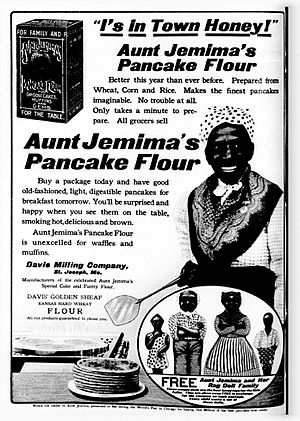
Rag doll versions of the characters were also offered as prizes in 1909. Early dolls looked poor, with patches and missing teeth. Over time, their appearance improved.
Marketing for the products often used the "Mammy" image. A famous slogan was "I's in Town, Honey," first used at the 1893 World's Fair. Marketers also made up stories about Aunt Jemima. They said she was a "loyal cook" on a fictional plantation in Louisiana. They claimed she had a secret recipe from before the Civil War. These stories were not true; the character was created by marketers to sell products.
The Logo's Changes
The first advertisements were like a cartoon. For many years, the image remained a caricature. Quaker Oats hired famous artist Haddon Sundblom to paint a new picture of Anna Robinson. The Aunt Jemima package was then redesigned with this new look.
Over the years, the Aunt Jemima image changed several times. In 1968, her face became a mix of different features. She looked slimmer and wore a white collar and a headband that looked like her old kerchief.
In 1989, for her 100th anniversary, her image was updated again. Her head-covering was removed, showing wavy, gray hair. She also had pearl earrings and a lace collar. This new look was meant to be more "sophisticated" and "contemporary." This image stayed on the products until early 2021.
Rebranding the Brand
On June 17, 2020, after the murder of George Floyd and the protests that followed, Quaker Oats announced a big change. They said the Aunt Jemima brand would be retired. A new name and image would replace it to help with racial equality. The image was removed from packages later in 2020. The name change happened later.
Some family members of the models who played Aunt Jemima did not agree with the change. They felt it was part of their family's history.
On February 9, 2021, PepsiCo, which owns Quaker Oats, announced the new name: Pearl Milling Company. The new brand was launched in June 2021.
People Who Portrayed Aunt Jemima
Many African American women played the role of Aunt Jemima. They were storytellers and models for the company.
Quaker Oats stopped having people appear as Aunt Jemima in 1965.
Nancy Green
Nancy Green was the first person hired to be the spokesperson for Aunt Jemima pancake mix. She was born into slavery in Kentucky. Dressed as Aunt Jemima, Green appeared at the 1893 World's Columbian Exposition in Chicago. She stood next to a giant flour barrel, cooked pancakes, sang songs, and told stories about the "Old South." She traveled to fairs and stores, with billboards announcing, "I'se in town, honey."
Nancy Green died in 1923 and was buried in an unmarked grave. A headstone was placed for her in 2020.
Lillian Richard
Lillian Richard played Aunt Jemima for 23 years, starting in 1925. She was born in Texas in 1891. Her job was to demonstrate pancake making. After she had a stroke around 1947–1948, she returned home. She died in 1956.
Lillian Richard was honored with a Texas Historical Marker in her hometown in 2012. Her hometown, Hawkins, Texas, is known as the "Pancake Capital of Texas" because of her.
Anna Robinson
Anna Robinson was hired to play Aunt Jemima at the 1933 Century of Progress World's Fair in Chicago. She was born around 1899 in Kentucky. Her appearance was more like the "mammy" stereotype than Nancy Green's. She traveled to famous places and made pancakes for celebrities. Her photos were used in very popular advertisements.
The Aunt Jemima packaging was redesigned to look like Anna Robinson. She reportedly worked for the company until her death in 1951.
Rosa Washington Riles
Rosa Washington Riles became the third face on Aunt Jemima packaging in the 1930s. She continued in this role until 1948. Rosa Washington was born in Ohio in 1901. She was a cook for a Quaker Oats executive and started doing pancake demonstrations at his request. She died in 1969.
Anna Short Harrington
Anna Short Harrington began playing Aunt Jemima in 1935 and continued until 1954. She was born in South Carolina in 1897. Quaker Oats found her cooking pancakes at the 1935 New York State Fair. Harrington died in 1955.
Edith Wilson
Edith Wilson was the face of Aunt Jemima on radio, television, and in person from 1948 to 1966. She was the first Aunt Jemima to appear in TV commercials. Wilson was born in Kentucky in 1896. She was a singer and actress. She appeared on radio shows like The Great Gildersleeve and Amos 'n' Andy, and in the movie To Have and Have Not. She died in 1981.
Ethel Ernestine Harper
Ethel Ernestine Harper played Aunt Jemima during the 1950s. She was born in Alabama in 1903. Before this role, Harper was a teacher and a performer. She toured Europe as part of a singing group. She died in 1979. She was the last person to be a model for the character's logo.
Rosie Lee Moore Hall
Rosie Lee Moore Hall played Aunt Jemima from 1950 until her death in 1967. She was born in Texas in 1899. She worked for Quaker Oats in Oklahoma before becoming Aunt Jemima. She died in 1967. Her grave was declared a historical landmark in 1988.
Aylene Lewis
Aylene Lewis played Aunt Jemima at Disneyland's Aunt Jemima's Pancake House. This was a popular restaurant in the park from 1957 until her death in 1964. Lewis was known for taking pictures with visitors and serving pancakes to important people. She also became friends with Walt Disney.
The Term "Aunt Jemima"
The term "Aunt Jemima" is sometimes used as a negative nickname for a Black woman. It is similar to "Uncle Tom" for a Black man. In this way, it refers to a Black woman who is seen as being too eager to please or serve white people.
For example, a mayor in Virginia was criticized for calling Kamala Harris "Aunt Jemima" after she was chosen as a vice presidential candidate.
Images for kids
See also
 In Spanish: Aunt Jemima para niños
In Spanish: Aunt Jemima para niños
 | Kyle Baker |
 | Joseph Yoakum |
 | Laura Wheeler Waring |
 | Henry Ossawa Tanner |


